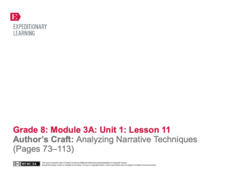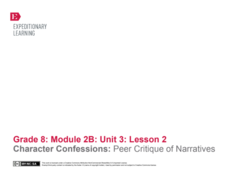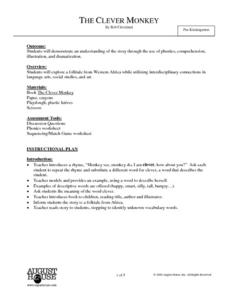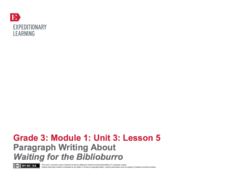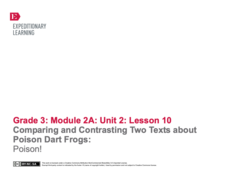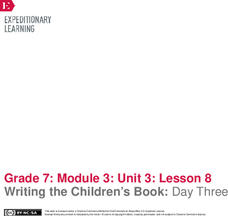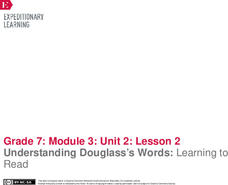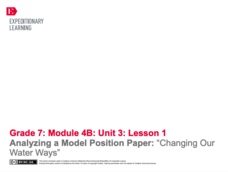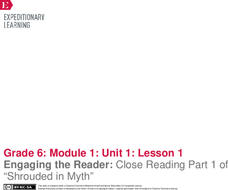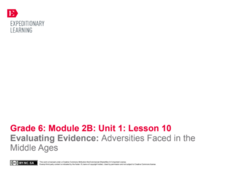EngageNY
Grade 9 ELA Module 4, Unit 1, Lesson 2
The second instructional activity in a unit about how writers develop their central ideas and use evidence to support their arguments focuses on the role that scholars at Jundi Shapur, "The World's First True University," played in the...
EngageNY
Inferring about Character: Close Reading of the Poem “Inside Out” and Introducing QuickWrites
Grab a partner! Scholars partner up to take a second look at the verse novel Inside Out & Back Again. They discuss questions about and connections to the novel and then learn how to complete a Quick Write task properly. To finish,...
EngageNY
Analyzing the Model Essay: Studying Argument (Chapter 27 Plus Synthesis of Scenes in Previous Chapters)
Scholars partner up to review a model essay and talk through the process leading up to writing their essays. During a second reading of the essay, learners locate and underline the claim given, reasons, and counterclaim. They then...
EngageNY
Author’s Craft: Analyzing Narrative Techniques (Pages 73–113)
Scholars discuss a reading selection in Unbroken by writing to a partner about text selection. After completing the writing, learners revisit the use of active and passive sentences by reviewing a second Active and Passive Sentences...
EngageNY
Character Confessions: Peer Critique of Narratives
Shake up the writing process with a peer critique. The second of four lessons in the Grade 8 ELA Module 2B, Unit 3 series first has young writers compare their interpretations of a scene from William Shakespeare's A Midsummer Night's...
Curated OER
Lesson 3: Idioms
You're as cute as a bug. But are you really as cute as a bug? Bugs aren't cute! Idioms are fun nonliteral phrases that mean something different than the words they contain. Second graders learn about idioms as they read the book, More...
August House
The Clever Monkey Rides Again
Use a West African folktale to practice several different skills in your first grade classroom. Learners read The Clever Monkey Rides Again and focus on rhyming words, reading comprehension, measurement, art, movement, and word order.
August House
The Clever Monkey
Your clever kindergartners will enjoy a series of activities based on the West African folktale, The Clever Monkey, adapted by Rob Cleveland. They sequence the story with pictures, copy sentences, illustrate idioms about cats, and taste...
Curated OER
Sentence Combining
Avoid short, choppy sentences in your class's writing by focusing on sentence structures. The first page in this two-page packet shows your class how to combine sentences using conjunctions, a list, an appositive, or compound predicate....
Curated OER
Phrases as Fragments
A sentence needs to have a subject and a verb. Although your kids know this, fragments often sneak their way into essays and homework assignments. Give your class a review session with this assignment. First, have them read the...
EngageNY
Mid-Unit 1 Assessment: Human Rights Vocabulary and Common Prefixes
Here is a mid-unit assessment for a group of lessons studying the Universal Declaration of Human Rights (UDHR). The first half of this instructional activity calls for several forms of review. Your class will review the content of the...
EngageNY
Vocabulary: Finding the Meaning of Words in Context in The Boy Who Loved Words
Here is a lesson plan that invites learners to engage in a kinesthetic activity that allows them to physically move and manipulate words in order to think about ways to understand vocabulary in context. After that activity is complete,...
EngageNY
Paragraph Writing About Waiting for the Biblioburro
Ask your learners to synthesize what they know about Waiting for the Biblioburro by writing a well-organized paragraph. Young writers focus on using transition words and including specific details in their paragraphs. The plan allows for...
EngageNY
Comparing and Contrasting Two Texts about Poison Dart Frogs: Poison!
Scholars compare and contrast two informational texts about Poison Dart Frogs. A brief vocabulary review and discussion lead the way to a two-part close reading—the first reading for gist the second reading for details. Followed by a...
EngageNY
End of Unit Assessment and Independent Reading Review
Reader, writer, illustrator ... scholars wear many hats! Pupils become experts in recommending books to their classmates as they write reviews of their independent reading books. Next, after finishing the second draft of their children's...
EngageNY
Writing the Children’s Book: Day Three
Illustrations are a key feature of children's books. Using the resource, pupils learn about adding illustrations to their children's books. Next, as they complete their storyboards and work on their second drafts, they consider their...
EngageNY
Close Reading Excerpt 2: Plantation Life
Time for a good old fashioned match game! Readers complete an initial, second, and third read of Plantation Life to gain a deep understanding. After close reading the text, scholars practice identifying paraphrasing by matching sentences...
EngageNY
Understanding Douglass’s Words: Learning to Read
How is a sentence like the human body? Scholars think about the comparison as they view an image of the human anatomy and begin to complete an Anatomy of a Sentence anchor chart. They review roots, prefixes, and suffixes and then begin...
EngageNY
Analyzing a Model Position Paper: “Changing Our Water Ways”
Follow the leader for better writing! Scholars analyze a model position paper, "Changing Our Water Ways." During the first pass, they listen as the teacher reads the paper aloud. They then do a second read of the paper and complete a...
EngageNY
Engaging the Reader: Close Reading Part 1 of “Shrouded in Myth”
Read and reread for better understanding. Scholars listen to a read aloud of Shrouded in Myth. They talk with a partner about the things they noticed and wondered about the text. They then listen to the text a second time to focus on the...
EngageNY
Connecting the Theme of the Expert Group Myth to a Theme in The Lightning Thief and to Life Lessons
Expert groups discuss the theme of their myths and the life lessons people learn from it. They then regroup their triads so that there is a pupil from each expert myth group and share details about their myths. The class also talks about...
EngageNY
Evaluating Evidence: Adversities Faced in the Middle Ages
How is that relevant? Scholars gain an understanding of the words relevant and compelling. They then go back to the End of Unit 1 Assessment Prompt: Adversity in the Middle Ages and look at the second bullet that pertains to relevant and...
EngageNY
Close Reading and Gathering Evidence from Frightful’s Mountain and “Welcome Back”
Where did the falcons go? Scholars read the article Welcome Back which describes the disappearance of falcons due to the use of pesticides. During a second read, learners annotate the text by marking unfamiliar words and facts about...
Curated OER
ASL 1: Lesson 1
Experience lesson one of an extensive American Sign Language series! Whether you are teaching ASL or learning it as a communication tool to use in your special education class, this lesson is great! Foundational signs, such as finger...





